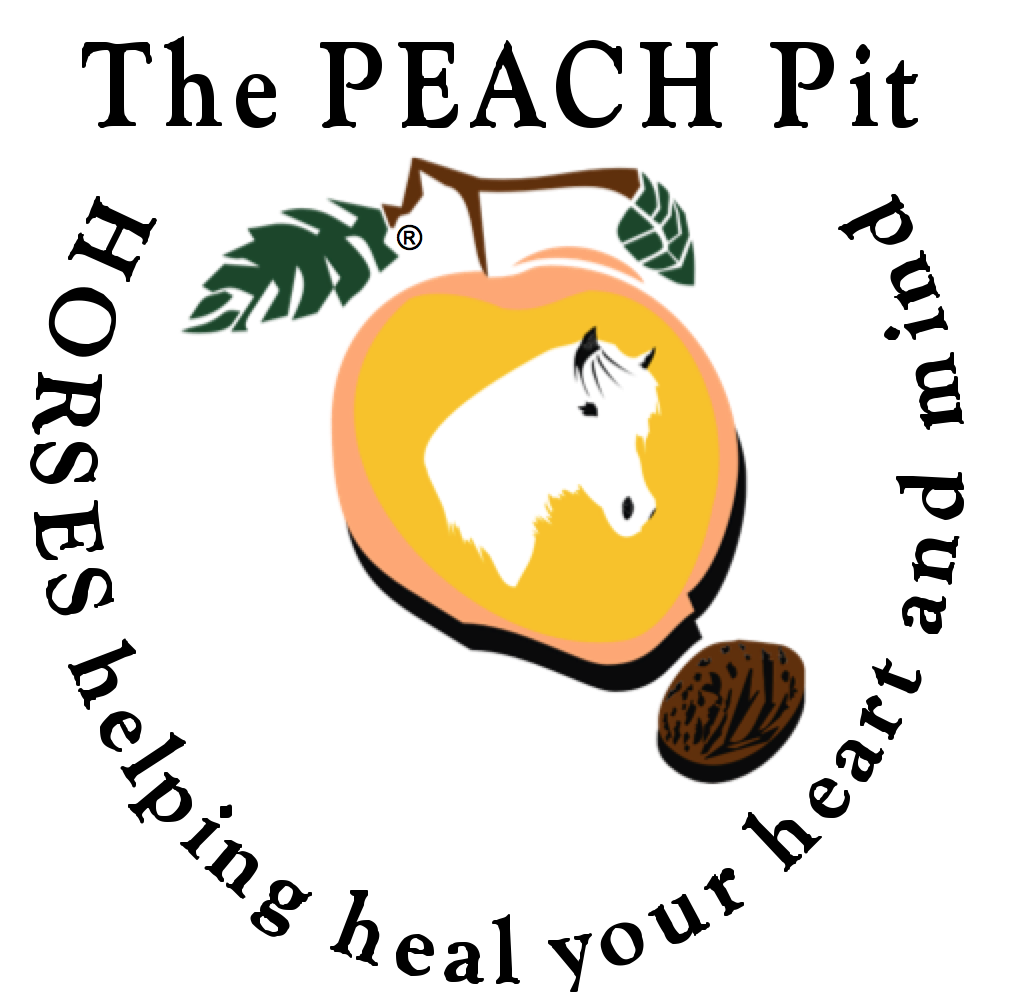The PEACH Pit
Horses helping heal your heart and mind. Come join us at the barn.
More FAQs
What are equine assisted psychotherapy and equine assisted learning?
Equine assisted psychotherapy (EAP) incorporates horses experientially for emotional growth and learning. You will be working with a qualified mental health professional, an equine specialist and horses to address your treatment goals. Activities with horses are designed to reflect life issues. This allows you and the therapist to “see” where problems are and find workable solutions. You generally will quickly recognize unhealthy patterns and enact new behaviors. Horses don’t accept “talk”; you have to make authentic changes to affect horses’ responses.
Equine assisted learning (EAL) involves a similar process but focuses on educational and human/organizational development goals in this highly interactive and impactful learning approach.
Why do you use horses?
Naturally intimidating to many, horses are large and powerful. This creates a natural opportunity for some to overcome fear and develop confidence. Working alongside a horse, in spite of those fears, creates confidence and provides wonderful insight when dealing with other intimidating and challenging situations in life.
Like humans, horses are social animals, with defined roles within their herds. They would rather be with their peers. They have distinct personalities, attitudes and moods; an approach that works with one horse won’t necessarily work with another. At times, they seem stubborn and defiant. They like to have fun. In other words, horses provide vast opportunities for metaphorical learning, an effective technique when working with even the most challenging individuals or groups.
Horses require us to work, whether in caring for them or working with them. In an era when immediate gratification and the “easy way” are the norm, horses require us to be engaged in physical and mental work to be successful, a valuable lesson in all aspects of life. Most importantly, horses mirror human body language. Many complain, “This horse is stubborn. That horse doesn’t like me,” etc. The lesson is that if you change yourself, the horses respond differently. Horses are honest, which makes them especially powerful messengers.
Is this the same as therapeutic riding?
No, therapeutic riding focuses on the physical therapeutic benefits to the rider that come from the movement and motion of the horse. The EAGALA Model does not involve riding and is focused on metaphors and creating specific experiences to address treatment or learning goals.
How will I benefit by using this model?
Because of their size and history with humans, horses have a unique appeal worldwide. This can help make your therapeutic process more engaging. The EAGALA model is solution-focused and client-centered which assumes you have your own best solutions, and need only the opportunity to discover them. Because of this and the nonverbal nature and appeal of horses, our model has grown worldwide, crossing cultures and countries. We provide you the opportunities to do more than talk. You learn from your experience, which tends to have longer-lasting impact.
How do I know this method will work for me and what I’m going through?
EAGALA certified professionals are incorporating the model into work on diverse issues, goals and populations. This can range from trauma, abuse, depression, anxiety, addictions, eating disorders, and other mental health and behavioral needs to educational objectives like working with business groups and leaders, schools, and other growth and learning needs.
Can this help treat active military or veterans suffering from PTSD?
Yes, there is growing interest and programming aimed in particular at returning combat veterans. Because there is a stigma normally attached to mental health treatment, the use of horses is especially beneficial, and experiential learning has proven a natural fit with this population. You can read more online: http://eagala.org/military.
What if I’m afraid of horses or never learned to ride?
The EAGALA model doesn’t include riding; all sessions are on the ground with horses. Allowing horses to be themselves and respond to the clients’ non-verbal messages enhances the opportunity for growth and learning as fears surface and are addressed in the context of other fears clients may face in their lives.
How many sessions will I need before I see results?
Like any mental health treatment or human development support, the number of sessions is quite individualized. However, professionals and clients alike report that the time spent in an EAGALA session has an impact that would commonly take several sessions, even months, in typical office therapy settings.
Will my insurance cover this therapy?
Rules and regulations that govern mental health coverage in your insurance apply to this work as well. The EAGALA model is a psychotherapy process and can be billed as such by the proper professionals following the individual insurance guidelines.
How does you choose horses for the program?
Any breed of horse may apply! The equine specialist decides which horses to use for each session. Because the EAGALA model doesn’t include riding, this opens up the arena to many horses that may not be wanted elsewhere. Each horse brings unique attributes you may be able to relate and find a metaphor in your own life.
Does you use rescued horses?
Yes. Rescue horses have faced certain challenges which may provide a powerful parallel in the lives of some clients. For example, a traumatized child in foster care may relate to a traumatized horse which was abandoned.
How do you ensure I’ll be safe if the horses run free?
There’s always a level of risk when working around horses. However, we limit this with the “no riding” standard and because the horses are free in the arena. Horses, by nature, are not aggressive. Their first line of defense is to move away. When horses are tied up or in a small area, this limits their ability to move away. The model supports a horse’s natural instinct to walk away by the nature of being loose in the space, and able to be their natural selves.
Will I have to pay more for these sessions than with talk therapy and why?
Because our model involves a professional team, your cost per session is higher than a psychotherapy session in the office. However, because you likely will need fewer sessions because of the impact horses have on you, most clients report the EAGALA approach is more cost-effective when taken as a whole treatment process.


